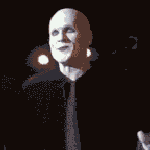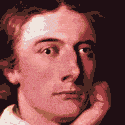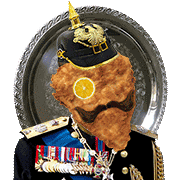|
I've been in multiple productions of The Magic Flute, in English and in German, and I still don't know what the gently caress it's about.
|
|
|
|

|
| # ? May 9, 2024 21:54 |
|
masonic propaganda
|
|
|
|
But also When The Foeman Bares His Steel is one of the great opera choruses, so just listen to some G&S too, like the Kevin Kline/Angela Lansbury Pirates of Penzance movie. Actually, there's a lot of great opera in English too. The Crucible by Robert Ward is particularly riveting, especially when Judge Danforth shows up. Benjamin Britten also was a prolific composer in opera (ymmv on Peter Pears' voice though). Albert Herring is funny, Peter Grimes is dark, and A Midsummer's Night Dream is late period Britten strange and beautiful.
|
|
|
|
I believe Henry Purcell's untimely death at a fairly young age likely robbed us of a whole movement of English language opera that could've been just as prominent as Italian and German opera. Check out the aria "When I am laid in Earth" from Dido and Aeneas, two interpretations I really like are by Janet Baker and Jessye Norman. His other opera's are really good too, but it's kind of like making comparisons between Mozart vs. Beethoven, Beethoven had an extra 20 years to develop and hone his music and push new frontiers, where Mozart (and Purcell) died around 35, right as their music was maturing into the sublime.
|
|
|
|
and yet Beethoven still never nailed the genre of opera. Dido and Aeneas is fantastic and easy to impulse watch since the run time is like 70 minutes pro tip for quickly browsing operas on YouTube: search composer + title and filter by Duration: Over 20 Minutes. saves you from having to sift through arias/gala concerts/trailers/etc 
|
|
|
|
Kaiser Schnitzel posted:I just listen to all the pretty music and donít really care about the plot. Mozartís operas all have very nice music to listen to and are very accessible-the plots are mostly pretty silly anyway. Find a recording that cuts out all the spoken parts and just has the real music parts if thatís what you want to do. This. Mozart's biggies are very melodic and easy on the ears. Same with Puccini, Verdi, etc. Try to snag a video copy of one with subtitles. I'd never watched Figaro with subs until a year or so ago, and it's hilarious if done right. It was an Australian production, go figure, that just nailed it.
|
|
|
|
landgrabber posted:i'm kinda just wondering how i should listen to opera to begin with. I can't do opera with electronic librettos, I need a book. Get a CD of something nice and accessible (Verdi, Bizet, Mozart) and read along. Knowing the plot going in is good as following the emotional beats of the plot (which is what determines the music) is more important than the often ridiculous plots. Tosca is good, any of the great Puccini or Verdi operas (well, maybe not Don Carlos) are good first operas. I wouldn't do Britten as an intro, he's not the most accessible jumping point despite being English Feels Villeneuve fucked around with this message at 19:04 on Aug 16, 2021 |
|
|
|
Also stick with major labels for releases of well known operas, excellent opera singers are extremely expensive and the big guys (mostly DG, EMI/Warner, Philips and Decca) could afford them. It's not like orchestral stuff where these days you can get great performances out of budget labels.
Feels Villeneuve fucked around with this message at 19:02 on Aug 16, 2021 |
|
|
|
zenguitarman posted:But also When The Foeman Bares His Steel is one of the great opera choruses, so just listen to some G&S too, like the Kevin Kline/Angela Lansbury Pirates of Penzance movie. Is Candide a musical for the purposes of this post, because that is probably my favorite English-language opera. Agreed that live performances are the best way to enjoy opera. Operas and baseball games, imo, must be experienced in person for full effect. I can't remember but I think Tosca was the first opera I saw.
|
|
|
|
Feels Villeneuve posted:I can't do opera with electronic librettos, I need a book. Get a CD of something nice and accessible (Verdi, Bizet, Mozart) and read along. yeah I heard tosca was a good beginner one and also the plot appeals. I've tried listening to madame butterfly as few times too and i like some of the music but i don't know all the plot beats, just the synopsis. i like how he literally just used star spangled banner for pinkerton.
|
|
|
|
1. I don't know a great deal of classical music, although I did sing a John Corigliano piece last time I was in a choir; what would I like if I liked that? It was his setting of Fern Hill, if it makes any difference, and when I went to listen to something else by him, I was not a fan, so no more Corigliano please. 2. I once heard a piano composition that was meant to evoke the Earth being swallowed by the Sun, and I've spent years trying to find it again. Anyone know what that one is? 3. What's all the good East Asian classical music? Not symphonies in the European tradition that just happen to have been written in Beijing or Tokyo or wherever, but forms and styles and compositions from anywhere in the pre-modern Orient. Whenever I try to find it myself, either the results are in languages I don't speak, or it's music that's falsely labeled as older than it is and sounds like what plays in the waiting room at massage parlors. Alvarez IV fucked around with this message at 19:05 on Aug 18, 2021 |
|
|
|
Alvarez IV posted:2. I once heard a piano composition that was meant to evoke the Earth being swallowed by the Sun, and I've spent years trying to find it again. Anyone know what that one is?
|
|
|
|
Spotify has a decent sampler playlist for contemporary Chinese classical: https://open.spotify.com/playlist/37i9dQZF1DX5AviTMPF0km?si=4cd78ecdde7e4262 to me Corigliano's most popular works are often in the vein of post-neo-romanticism, taking the torch from Barber, Menotti, et al. do you like any of these? https://www.youtube.com/watch?v=X_0fWAG9ONM https://www.youtube.com/watch?v=BDRN8q_o6-k https://www.youtube.com/watch?v=XBNCfdBjSso https://www.youtube.com/watch?v=nETUYFwdnRQ https://www.youtube.com/watch?v=2vv-aokV6kA but also a lot of the fun with contemporary classical music is in the hunt. see who jumps out at you on this playlist of more recent works: https://open.spotify.com/playlist/3zuIRXDOweCUVsabgo8nOW?si=0e6340d8f7f14f9a
|
|
|
|
Llamadeus posted:Scriabin's Vers la flamme? I've been looking for this for years, thank you!
|
|
|
|
Barber, Rochberg, Gorecki (there was a period where Gorecki 3 was like the hottest thing to program in the early 90s) are good in the "neo-romantic", more tonal late 20th century mold.
|
|
|
|
listening to madam butterfly now and it pretty much bangs
|
|
|
|
out of curiosity does anyone have any pianist favorites who specialize in 20th century/contemporary/avant-garde stuff who aren't Marc-Andre Hamelin nothing against Marc-Andre Hamelin but he mostly records on Hyperion who are the one major classical label who don't do streaming
|
|
|
|
Pierre-Laurent Aimard
|
|
|
|
Feels Villeneuve posted:out of curiosity does anyone have any pianist favorites who specialize in 20th century/contemporary/avant-garde stuff who aren't Marc-Andre Hamelin I recently enjoyed an album called "Avant-garding Mompou" by the Catalan pianist Maria Canyigueral.
|
|
|
|
I bought Ryuichi Sakamoto's album BTTB on a whim recently, and it's kicked off a noble attempt to finally get into classical music for me. Ryuichi Sakamoto's piano pieces have a really strong impact on me. I really appreciate how quiet and expressive his playing is. Many of the pieces make me think of mortality and the balancing act of recognizing mortality while also finding hope/serenity. At least, that's the impression I get when I close my eyes and listen to his playing. I didn't have too much exposure to classical music growing up; most of it came from music being used as soundtracks. Thanks to Neon Genesis Evangelion I've grown a really deep fondness for Bach's Jesus bleibet meine Freude and Beethoven's 9th Symphony. I like Chopin's Nocturnes quite a bit as well. As a teenager I was really into Danse Macabre by Camille Saint-Saens, and I really loved the melody from Faure's Apres un Reve (thanks to a trashy anime that was really popular at the time that used it for its ending theme). As part of my noble attempt, I've picked up a bunch of used records that caught my eye. I'm just going to spitball my (unrefined) first impressions of these albums because otherwise it'd just become background music to me: Brahms' Piano Concerto No. 1 (Rubinstein/Leinsdorf) - really couldn't get into this. I found myself growing impatient and annoyed listening to it. It feels very turgid. Maybe I'll grow to appreciate it? Beethoven's Emperor Concerto (Rubinstein/Leinsdorf) - The way the piano elegantly dances between the orchestra really works for me here and makes the whole thing very captivating in a way the Brahms concerto did not for me. The orchestra has a grace and rhythm that really blends well with the piano. Ravel's Habanera / Ravel's Sonata for Violin and Piano / Grieg's Sonata No. 3 Op. 45 (Wilkomirska/Barbosa) - I foolishly bought this thinking it was "Ravel's Grieg Sonata" lol. Oops. Grieg's sonata seems like it vacillates between sweet harmony between the violin and piano, and extremely dramatic dissonance that feels pretty heavy-handed. When they're in harmony it's very gorgeous though, sweetly singing violin and piano chords that feel like they're lifting the piece higher and higher, almost like an ascent to heaven. Ravel's Habanera is very seductive and mysterious, I like it quite a bit. His sonata sounds anxious and pensive to me. For the first movement, it feels like the violin is a very thick, tense atmosphere and the piano is quiet footsteps secreting beneath it. It's cool. The second movement sounds like some kind of spooky bayou nightmare. Franck's Sonata in A (Friedman, Previn) - The first movement of Franck's Sonata has some of that sweetly singing violin like Grieg's, but the piano has some tooth to it, it makes me want to bite into it. Their interrelationship feels a lot more nuanced than the Grieg piece. The opening to the second movement reminds me of Hiromi Uehara's jazz, cool and intense. I'm going to be honest, the violin doesn't do much for me, it sounds kind of shrill and sharp--I almost wish it were a viola or a cello or honestly not there at all. The piano in the third movement has a dreamlike quality to it that reminds me of some of John Cage's pieces like In a Landscape or Dream. The fourth movement is really good, and the violin and piano share this very cool little melodic theme that gets passed between them. Debussy's Sonata in G Minor (Friedman, Previn) - This is some good poo poo. I only knew Debussy from Claire de Lune and The Girl with the Flaxen Hair and Arabesque. I read that this was Debussy's last composition, and that he was very depressed about the world war and its fallout. That makes sense because this sonata is powerful and brooding as hell. I'm pretty much full of crap but these were my subjective feelings. Thanks for attending my tedtalk. I really am looking forward to getting acquainted with Glenn Gould's 1955 bach album next
|
|
|
|
If you want a great "disturbed by war" (in this case, WWI) piece, look for a recording of "La valse" by Ravel. The Charles Munch version is especially good- one thing you frequently hear about the work is the image of Viennese ballrooms with bombs going off in them, though IIRC Ravel denied any political message in the piece.
|
|
|
|
I have been on a Morton Feldman kick lately. Bizarrely he reminds me of Webern which is hilarious since Webern is known for extremely short pieces and Feldman for extremely long ones (the infamous String Quartet No. 2 can last up to six hours), but they both have that sort of "suspended in air" feeling that one writer compared to a musical version of an artistic mobile. Rothko Chapel is probably the best place to start, but I really, really liked Triadic Memories. It's minimalist in the sense that it's based on sustained mood, and small but significant changes over an extended period of time - it's his longest solo piano work technically but most renditions seem to last about 90 minutes. (This one is 60 - the nature of Feldman compositions mean there is a lot of variation in how long pieces can last). https://www.youtube.com/watch?v=46X7s2T93XY This isn't background/ambient music in the sense that you aren't supposed to pay close attention to it btw- It can probably work that way but it really rewards just getting in a nice quiet space and focusing on it. If that sounds like something you'd like, heyo. Feels Villeneuve fucked around with this message at 16:20 on Sep 12, 2021 |
|
|
|
Was relistening to beethoven's emperor concerto and was just completely in awe of the second movement. I had to go back and listen to it over and over again. It's like, straight up.... transcendent? When the strings swell in warmly, and the piano plays that light fluttering passage, it's like fingers reaching out and grabbing hold of eternity, only to see it slip out of your grasp and gradually float away. It sounds like the piano and orchestra are building up to try to recapture that climax, but aren't able to, and the piece gently fades into acceptance of how transitory that moment was. one thing i really don't understand is the structure of a concerto. I feel like if beethoven had let that second movement stand alone, his audience would be leaving the concerto sobbing with tears in their eyes. but instead, the piece very consciously flows straight into the third movement, which is really busy and active and almost feels like it's burying or suppressing the transcendence of the second movement. why???? I guess I'm thinking of it like a Shakespeare play--you wouldn't have the heartbreaking stuff happen in the middle of the play and then put a bunch of slapstick at the end.
|
|
|
|
First, I just wanna say that I really appreciate and admire the way you write about the experience of listening to music. Always a pleasure. Keep the posts coming. it was always explained to me that it took forever for composers to feel free to compose fully outside of Formal conventions. A piano concerto has 3 movements, and the last one has to be a banger- those are the rules. In the Concerto genre, it offers great pianist the opportunity to flex and demonstrate the greatest range of emotion and expression as possible, in addition to their technical prowess. In the Late Romantic period we got much more programmatic orchestral music like Tone Poems, Rhapsodies, orchestral Serenades, etc where composers got to spread their creative wings more, before Modernism and eventually the Avant-Garde opened the doors to everything and anything. Looking at listeners of Beethoven today, many are clearly opting to listen only to the second movement:      Seriously, try to find a recording where the second movement doesn't have the most plays.
|
|
|
|
Concertos which end with a quiet movement or aren't particularly virtuosic still rarely get played. When people pay for soloist performances they still want to see them go wild.
|
|
|
|
Cephas posted:Was relistening to beethoven's emperor concerto and was just completely in awe of the second movement. I had to go back and listen to it over and over again. It's like, straight up.... transcendent? When the strings swell in warmly, and the piano plays that light fluttering passage, it's like fingers reaching out and grabbing hold of eternity, only to see it slip out of your grasp and gradually float away. It sounds like the piano and orchestra are building up to try to recapture that climax, but aren't able to, and the piece gently fades into acceptance of how transitory that moment was. If you haven't listened to Beethoven Op. 111, well, listen to Beethoven Op. 111 (Pollini is my favorite performer from that, in his "The Late Piano Sonatas" record which is one of the best classical records ever made)
|
|
|
|
Iím listening to Beethovenís 5th symphony for the umpteenth time but really paying attention and he is such a loving tease in the third movement. Just keeps getting sooooo close to resolving all that tension but will not let you get there. You think finally this insane coda is gonna do it but nope, ends in weird funky chord that still doesnít take you back home. Big thanks to whoever recommended that Robert Greenberg Great courses thing upthread! Itís really been amazing. Iím still on Mozart but having a little bit of an understanding of what a classical symphony is supposed to do has made me appreciate fir the first time how different Beethoven really is, at least by symphony #5. ItísÖ..definitely not classical anymore.
|
|
|
|
Kaiser Schnitzel posted:Iím listening to Beethovenís 5th symphony for the umpteenth time but really paying attention and he is such a loving tease in the third movement. Just keeps getting sooooo close to resolving all that tension but will not let you get there. You think finally this insane coda is gonna do it but nope, ends in weird funky chord that still doesnít take you back home. You're welcome! The 3rd really started his break from the classical structure, but yes, the 5th for sure stands out as Beethoven's tour de force out of the classical and firmly into the Romantic. I really enjoyed the course, it's what kickstarted my deep dive into Western concert music.... now I have 100-200 $1-$5 vinyls of phenomenal performances and a lot of great recordings saved on Tidal 
|
|
|
|
This may be an odd question, as this pertains more to musical history, specifically odd personal history of a composer. I was listening to the local public radio classical music program while driving and they had the first part of a story about a composer who took a day trip to New York City to cash a check/get a haircut and went missing. This would have been early 1900's most likely based on the setting of the story, but the composer went missing and it turned into a frantic search to find him, with his wife calling all their friends in NYC and eventually the police. I can't remember the name of the composer to look up how the story ends and it has been bugging me ever since. I presume he was eventually found. Does anyone know which composer this story was about?
|
|
|
|
currently dying imagining a video of a guy beating off, but Turkish March is playing over it
|
|
|
|
Yeah, I just finished the great courses audiobook as well. It's really educational and the idea of opera being a renaissance attempt to recapture the lost technology of the ancient Greeks was extremely fascinating to me. Listening to Chopin's Nocturnes right now, by Alexis Weissenberg. I've always loved these pieces as background music for reading, writing, or drinking tea. So I've heard them a lot even though I haven't really listened carefully to them before. The pieces have a delicateness to them and a wistfulness, a gentle longing that I think belongs to the nocturnal realm. Nocturnes, Op. 9: No. 1 in B flat major, Larghetto is my favorite. The interplay of the rhythmic left hand notes and the melodic right hand notes is so gorgeous, and it has this moving momentum to it. When I close my eyes I see a sea of clouds, like looking out an airplane window at night as a child, when you can't sleep, and seeing the vast field of tops of clouds, with the nighttime water and land beneath them. That kind of longing of being able to look out at the horizon that lay at the end of the top of the clouds. Maybe to Chopin it would have been a carriage or a train ride at night. There's a grace and naturalness to Chopin's Nocturnes that stands out to me. Listening to program music like Dvorak's New World Symphony, I felt like I was always actively engaging with the composer's project, like I was listening to the musical equivalent of an epic western with plot twists and tender scenes and heroes shimmying across canyon ledges. But with Chopin's Nocturnes, it feels less like an artist's high-wire act and more like being surrounded by swirling air.
|
|
|
|
Samadhi posted:This may be an odd question, as this pertains more to musical history, specifically odd personal history of a composer. I remember a story about Mahler getting lost on the New York subway around that time, though he actually had a job with the NYP there.
|
|
|
|
Been on a Ravel kick lately. I'm completely in love with Pavane for a Dead Princess. A lot of his pieces have both an orchestral and a piano arrangement, and it's interesting to compare them. Something about the fullness of the orchestra really softens the sadness of the Pavane. The violin plucking and rhythm of the bassline feel reassuring over the sound of the lonesome horn, and the harp is so gentle and spine-tingling when it sneaks in. It's such a melancholic piece, but the harmony of the orchestra makes it sound really beautiful and stately. By comparison, the piano arrangement is just heartbreakingly lonely. The harp's piece, which sounds so lovely and enchanting in the orchestra, on piano sounds like opening the door to your childhood home and finding it desolate and bare. https://www.youtube.com/watch?v=GKkeDqJBlK8 https://www.youtube.com/watch?v=MPZROBIFHWY I also really have enjoyed listening to his Bolero over and over for the last few weeks. It sounds like a military march, but there's something kind of cute about it? It's very jovial and almost episodic. It makes me imagine soldiers going on the same patrol day in and day out, sometimes seeing one sight or another, but never having anything out of the ordinary to report. The piano version of this, I think is, is pretty similar to the orchestral arrangement, although it seems to be a much less common piece to perform on piano. https://www.youtube.com/watch?v=mzMi_oz9chw https://www.youtube.com/watch?v=cxjfu4kY3bI La Valse is really interesting to compare as well. I definitely can hear the "bombing a Viennese ballroom" interpretation. The solo piano arrangement is so dark and grimy. The darkness of the low pounding notes, contrasting with the elegant waltz melody that it constantly interrupts, really stands out when it's all on a single piano. When it sounds like a regular waltz, the music is very circular and round, and the violent interruptions make it feel a bit like a night where your dreams keep turning into nightmares. It sounds so much like the pretty notes are trying to pull away from the muck of the dark notes, the image that comes to mind for me is a dove trying to escape from an oil spill. The piano arrangement is so dark and frightening and dirty sounding. The orchestral version somehow sounds less unsettling to me. It still has a dark and edgy sound, but in a way, the dissonant parts being clearly an outside force (drums, cymbals clashing, etc.) from the stately waltz segments helps create a feeling of "normalcy being interrupted by violence." Whereas in the piano version, where the instrument itself feels like it's being torn between two forces, the idea feels closer to "grace trying to free itself from darkness." https://www.youtube.com/watch?v=TMSgWhIENSk https://www.youtube.com/watch?v=ghY2ak8YoBM
|
|
|
|
Cephas posted:Been on a Ravel kick lately. I'm completely in love with Pavane for a Dead Princess. A lot of his pieces have both an orchestral and a piano arrangement, and it's interesting to compare them. Something about the fullness of the orchestra really softens the sadness of the Pavane. The violin plucking and rhythm of the bassline feel reassuring over the sound of the lonesome horn, and the harp is so gentle and spine-tingling when it sneaks in. It's such a melancholic piece, but the harmony of the orchestra makes it sound really beautiful and stately. By comparison, the piano arrangement is just heartbreakingly lonely. The harp's piece, which sounds so lovely and enchanting in the orchestra, on piano sounds like opening the door to your childhood home and finding it desolate and bare. Ravel's solo piano arrangement of Pavane is so heartbreaking, that I have a really hard time listening to it, especially now that I have a daughter. I've literally walked out of a store in which it was on because I was not in the mood to fall into an emotional stupor. That said, it truly is one of my favorite pieces to listen to and to play on the piano, and it's amazing what great music can make one feel.
|
|
|
|
There are a lot of ways to play La Valse but I usually love the ones which go for maximum modernist nihilism. Boulez and Rene Leibowiz (amusingly on a Readers Digest LP set of "light classical music", because nothing is lighter than loving La Valse) are good for that.
|
|
|
|
Mederlock posted:I believe Henry Purcell's untimely death at a fairly young age likely robbed us of a whole movement of English language opera that could've been just as prominent as Italian and German opera. Check out the aria "When I am laid in Earth" from Dido and Aeneas, two interpretations I really like are by Janet Baker and Jessye Norman. His other opera's are really good too, but it's kind of like making comparisons between Mozart vs. Beethoven, Beethoven had an extra 20 years to develop and hone his music and push new frontiers, where Mozart (and Purcell) died around 35, right as their music was maturing into the sublime. please listen to all of harmonia sacra i beg of you
|
|
|
|
Logflat Badness posted:please listen to all of harmonia sacra i beg of you Queued up for later 
|
|
|
|
Trying to work my way through the thread and get back into classical after buying a turntable and discovering just how cheap/good a lot of old classical recordings are. I grew up in Suzuki and got overexposed to the point where I listened to very little classical for the last 20 years. But random timely question: whats everyone's favorite classical Christmas music and or recording thereof? I'm looking for some intereing stuff that is more in line with a choir in a rennaisance church than the pops orchestra playing jingle bells.
|
|
|
|
stealie72 posted:Trying to work my way through the thread and get back into classical after buying a turntable and discovering just how cheap/good a lot of old classical recordings are. I grew up in Suzuki and got overexposed to the point where I listened to very little classical for the last 20 years. Benedictine or Gregorian Monks, Mediaeval Baebes.....
|
|
|
|

|
| # ? May 9, 2024 21:54 |
|
I don't think you can go wrong with any of John Eliot Gardiner's recordings of the Bach cantatas.
|
|
|























